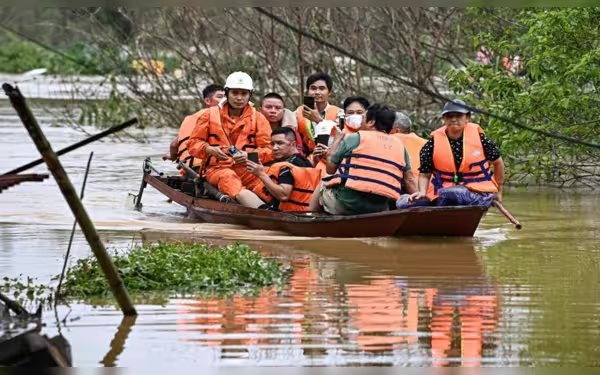Saturday, November 16, 2024 09:24 PM
UNICEF Reports Six Million Children Affected by Typhoon Yagi in Southeast Asia
- Nearly six million children impacted by Typhoon Yagi.
- UNICEF highlights urgent need for humanitarian assistance.
- Thailand's death toll rises to 18 amid ongoing crisis.
 Image Credits: brecorder
Image Credits: brecorderUNICEF reports nearly six million children affected by Typhoon Yagi, emphasizing urgent humanitarian needs across Southeast Asia.
In recent weeks, Southeast Asia has been grappling with the devastating aftermath of Typhoon Yagi, which has wreaked havoc across several countries in the region. The United Nations has reported that nearly six million children have been affected by this disaster, highlighting the urgent need for humanitarian assistance. The typhoon, which struck almost two weeks ago, brought with it powerful winds and torrential rainfall, leading to deadly floods and landslides in Vietnam, Thailand, Laos, and Myanmar.
As the situation unfolds, the death toll continues to rise. Thailand has reported three additional fatalities, bringing the total number of deaths in the kingdom to 18. Across the region, the confirmed death toll has reached a staggering 537. The impact of Typhoon Yagi has been particularly severe on children, with UNICEF stating that access to essential services such as clean water, education, healthcare, food, and shelter has been severely compromised.
June Kunugi, the UNICEF Regional Director for East Asia and the Pacific, emphasized the plight of the most vulnerable populations, stating, "The most vulnerable children and families are facing the most devastating consequences of the destruction left behind by Typhoon Yagi." In Vietnam alone, approximately three million people are at risk of disease due to a lack of safe drinking water and sanitation facilities.
In Myanmar, the situation is dire, with nearly 400,000 individuals displaced from their homes due to flooding. This crisis compounds the suffering of a population already enduring over three years of conflict between the military and various armed groups. UNICEF has pointed out that Typhoon Yagi has exacerbated an "already dire humanitarian situation" in Myanmar, pushing marginalized communities into an even deeper crisis.
In response to the escalating needs, the World Food Programme has announced an emergency response initiative in Myanmar, aiming to distribute a one-month ration of emergency food to up to half a million people. This effort is crucial as the region faces the dual challenges of climate change and humanitarian crises, which disproportionately affect children. According to UNICEF, children in East Asia and the Pacific are six times more likely to be impacted by such disasters compared to their grandparents.
The increasing frequency and severity of extreme weather events, such as Typhoon Yagi, can be attributed to climate change and warming oceans, driven by human activities. As we reflect on this tragic situation, it is essential to recognize the urgent need for global cooperation and action to address the underlying causes of climate change. By working together, we can help protect vulnerable populations, especially children, from the devastating impacts of future disasters. It is a call to action for all of us to contribute to a more sustainable and resilient future.













